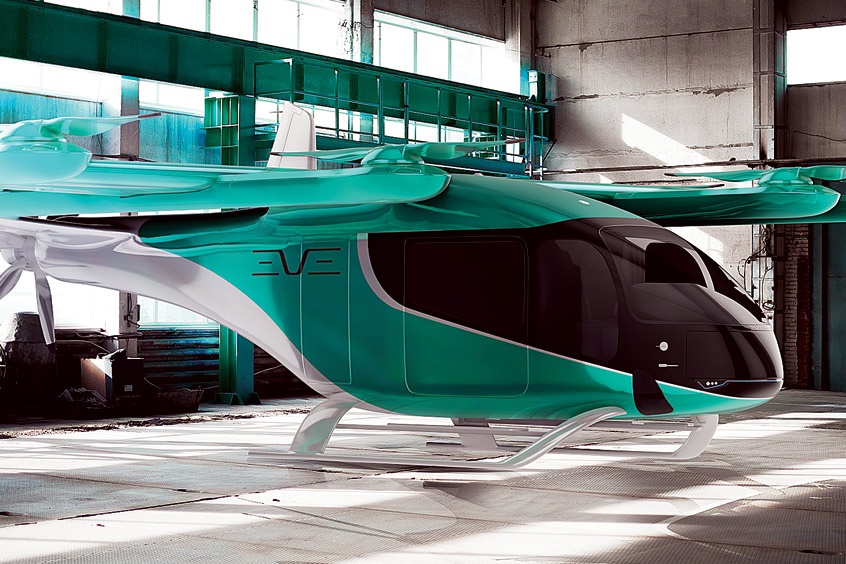ACE 2026 - The home of global charter.
 The bimonthly news publication for aviation professionals.
The bimonthly news publication for aviation professionals.

Eve Air Mobility has named the first three suppliers for its eVTOL aircraft: Nidec Aerospace, a joint venture between Japan's Nidec Corporation and Brazil's Embraer, will provide the electric propulsion system; BAE Systems will provide an advanced energy storage system; and DUC Hélice Propellers will supply the rotors and propellers.
“The announcement of the first suppliers is a key milestone in the development of our eVTOL aircraft,” says co-CEO Andre Stein. “As we advance toward entry into service, our goal is to make sure that we produce and deliver a mature aircraft that not only exceeds expectations but enables our customers to operate safely and efficiently with the lowest cost of operation.”
Motor manufacturer Nidec Aerospace will develop the electric propulsion system, and is backed by Embraer's more than 50 year history of aerospace experience to design, certify, produce and commercialise next-generation electric propulsion systems based on well-proven technologies.
“We are excited to have Eve as our launch customer for Nidec Aerospace's new electric propulsion system,” says Michael Briggs, senior vice president and president of the motion and energy business unit at Nidec. “With our cutting-edge technologies, Nidec Aerospace and Eve together are well-positioned to drive and accelerate advances in electrified urban air mobility towards a more sustainable future.”
BAE System's energy storage system will allow the aircraft to efficiently operate with zero emissions and low noise. It leverages the company's more than 25 years of experience in providing dependable electric power and propulsion for transit buses and other heavy-duty vehicles. That experience, combined with its history of developing flight critical control systems for aerospace, is ideal for urban air mobility (UAM) applications that depend on safety, reliability and efficiency.
“BAE Systems is leading the development of advanced technology solutions and systems that will help create a more sustainable future in aviation,” says Ehtisham Siddiqui, vice president and general manager of controls and avionics solutions. “We are delighted to support Eve Air Mobility with our innovative energy storage system for its eVTOL aircraft.”
DUC Hélice Propellers will supply the rotors for the eight lift motors and the cruise propeller. Based in France and with a presence in the US, the company has more than 25 years of experience and expertise in the analysis, design, development, manufacture and maintenance of propellers, rotors, fans and other carbon composite aeronautical accessories acquired through participation in multiple aviation programmes.
“We are extremely honoured to have been selected by Eve Air Mobility as the supplier of the rotors for the eight lift motors and the cruise propeller for its production vehicle,” says president and founder Duqueine Vincent. “We are grateful to Eve for putting its trust in us.”
During the past year, Eve has been working closely with certification authorities to define certification requirements while also continuing to engage with customers to understand how they will operate the aircraft and incorporate their feedback. The company has continued to advance its testing phase as part of maturing its eVTOL design. Eve recently completed wind tunnel and propeller tests and began testing its vertical lift rotors aboard a new custom truck-mounted platform in May. Eve has continued to update the aircraft to match its vehicle design to customer needs with a focus on efficiency, safety, reliability, sustainability and cost of operation.
Eve's eVTOL aircraft utilises a lift+cruise configuration, with eight dedicated propellers for vertical flight and fixed wings to fly on cruise, with no change in position of these components during flight. The latest concept includes an electric pusher powered by dual electric motors that provide propulsion redundancy while ensuring high performance and safety. While offering numerous advantages including lower cost of operation, fewer parts, optimised structures and systems, it has been developed to offer efficient thrust with low sound.
“Eve has taken a 'building blocks' approach to further enhance the maturity of the technology and its eVTOL,” says vice president of programme management and operation Alice Altissimo. “We continue to make very good progress, and we are looking forward to working with these new suppliers as we accelerate the world's transition to sustainable air travel.”
Eve expects to name additional component suppliers for flight-control systems, avionics, airframe and power-management systems in the future. The company plans to start the assembly of its first full-scale eVTOL prototype during the second half of 2023, followed by the test campaign in 2024. Eve's eVTOL is scheduled to begin deliveries and enter service in 2026.